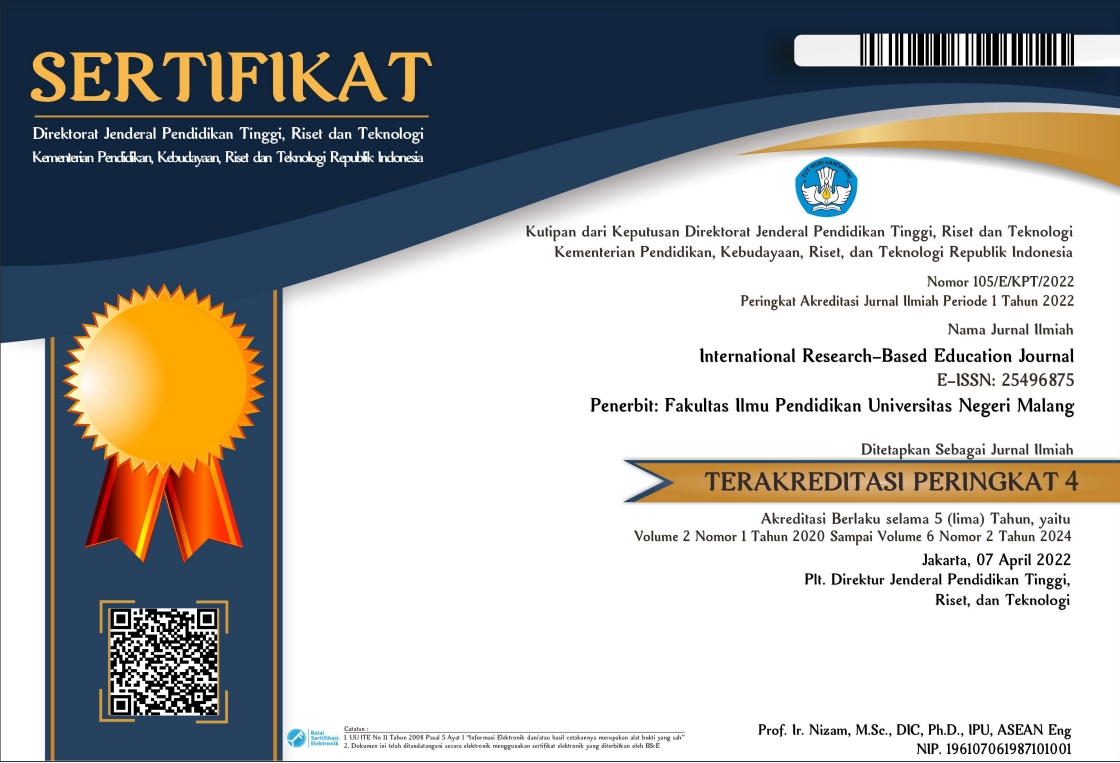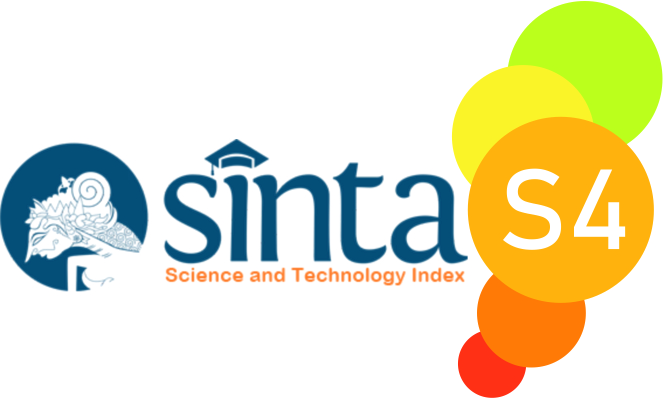An Analysis of Distance Learners' Technological Competence on Moodle-Based Learning Experiences
Abstract
The purposes of this paper were to describe distance learners’ Moodle-based learning experiences during the Covid-19 pandemic and to analyze distance learners’ technological competence through Moodle-based learning experiences. This study used qualitative method to characterize and analyze the digital competence required to maximize the usage of the Moodle platform as a course media. The questionnaire and Focus Group Discussion (FGD) were used in collecting the data. The total of 509 participants responded to the survey and 17 participants were participated in FGD. The results reveal that the students experienced several obstacles in participating in online learning using the Moodle platform. especially for students who live in remote areas, there are many obstacles; starting from the difficulty of getting an internet connection, data limitations due to having to take many courses, and lack of motivation in completing assignments. Furthermore, the findings also show that students have a fairly high level of technological competence. The paper figures out the digital competences owned by the students in facing new tools and exploiting the technological potentials in a flexible way. This study is crucial due to the important of helping students to understand online learning goals which in turn might increase their primary knowledge, technological usage and behaviors. Furthermore, it is also important for institutions to prepare clear policies to develop their learning systems.
Keywords
Full Text:
PDFReferences
Adedoyin, O. B., & Soykan, E. (2020). Covid-19 pandemic and online learning: the challenges and opportunities. Interactive Learning Environments, 0(0), 1–13. doi: https://doi.org/10.1080/10494820.2020.1813180
Abdulteeef, A., & Khateeb, M. Al. (2017). Measuring Digital Competence and ICT Literacy: An Exploratory Study of In-Service English Language Teachers in the Context of Saudi Arabia. International Education Studies; Vol.10, No. 12 Published by Canadian Center of Science and Education. doi: https://doi.org/10.5539/ies.v10n12p38
Allo, M. D. G. (2020). Is the online learning good in the midst of Covid-19 pandemic? The case of EFL learners. Jurnal Sinestesia, 10(1), 1–10. doi: https://tinyurl.com/2p94fck2
Calvani, A., Cartelli, A., Fini, A., & Ranieri, M (2008). Models and instruments for assessing digital competence at school. Journal of E-learning Knowledge Society, 4 (3), 183-193. doi: https://doi.org/10.20368/1971-8829/288
Coates, H., James, R., Baldwin, G. J. T. e., & management. (2005). A critical examination of the effects of learning management systems on university teaching and learning. 11, 19-36. doi: https://doi.org/10.1007/s11233-004-3567-9
DG Connect. (2014). Measuring Digital Skills across the EU: EU Wide Indicators of Digital Competence. doi: https://doi.org/10.2760/897803
El-Bahsh, R., & Daoud, M. (2016). Evaluating the use of Moodle to achieve effective and interactive learning: A case study at the German Jordanian University. Paper presented at the Proceedings of the 35th Annual IEEE International Conference on Computer Communications. Available at http://osscom2016.osscom.org/sites/default/files/files/Evaluating%20the%20Use%20of%20Moodle%20to%20Achieve%20Effective%20and%20Interactive%20Learning.pdf
Ganievich, M.Y and Toshpulatov, A.K (2021). The Concept of Technological Competence and Its Significance. International Journal on Integrated Education. (4) 7. doi: https://doi.org/10.31149/ijie.v4i7.2072
Guo, W., Chen, Y., Lei, J., & Wen, Y. (2014). The effects of facilitating feedback on online learners’ cognitive engagement: Evidence from the asynchronous online discussion. Education Sciences, 4(2), 193-208. doi: https://doi.org/10.3390/educsci4020193
Iqbal, Sofia, & Sohail, S. (2021). Challenges of Learning During the Covid-19 Pandemic. Journal of Gandhara Medical and Dental Science, 8(2), 1. doi: https://doi.org/10.37762/jgmds.8-2.215
Jacobs, Nick (2019). Are Online Learning, Virtual Learning, E-Learning, Distance Learning, and Blended Learning the Same?. Available at https://conexed.com/2019/11/11/are-online-learning-virtual-learning-e-learning-distance-learning-and-blended-learning-the-same/
Khalil, R., Mansour, A. E., Fadda, W. A., Almisnid, K., Aldamegh, M., Al-Nafeesah, A., Alkhalifah, A., & Al-Wutayd, O. (2020). The sudden transition to synchronized online learning during the COVID-19 pandemic in Saudi Arabia: A qualitative study exploring medical students’ perspectives. BMC Medical Education, 20(1), 1–10. doi: https://doi.org/10.1186/s12909-020-02208
Khotari. (2002). Research Methodology Methods and Techniques. New Delhi: New Age International.
Kosimov, Sh. U., Rafiqova, M. R., & Murodova, M. I. (2021). Implementation of the Technological Competence of Future Specialists. Creative Education, 12, 666-677. doi: https://doi.org/10.4236/ce.2021.123046
Lowenthal, P. R., West, R. E., Archambault, L., Borup, J., & Belt, E. S. (2021). Faculty perceptions of using synchronous video-based communication technology. Online Learning Journal, 25(4), 49–78. doi: https://doi.org/10.24059/olj.v25i4.2890
Manchia, M., Gathier, A. W., Yapici-Eser, H., Schmidt, M. V., de Quervain, D., van Amelsvoort, T., Bisson, J. I., Cryan, J. F., Howes, O. D., Pinto, L., van der Wee, N. J., Domschke, K., Branchi, I., & Vinkers, C. H. (2022). The impact of the prolonged COVID-19 pandemic on stress resilience and mental health: A critical review across waves. European Neuropsychopharmacology, 55, 22–83. doi: https://doi.org/10.1016/j.euroneuro.2021.10.864
Pavlova, M (2009). Technology and Vocational Education for Sustainable Development. Queensland: Springer Science Business Media B.V. Griffith Institute for Educational Research: Australia. doi: https://doi.org/10.1007/978-1-4020-5279-8
Quintana, R. M., Pinto, J. D., & Tan, Y. (2021). What we learned when we compared discussion posts from one mooc hosted on two platforms. Online Learning Journal, 25(4), 101–118. doi: https://doi.org/10.24059/olj.v25i4.2897
Rahayu, R. P., & Wirza, Y. (2020). Teachers’ Perception of Online Learning during Pandemic Covid-19. Jurnal Penelitian Pendidikan, 20(3), 392–406. doi: https://doi.org/10.17509/jpp.v20i3.29226
Robinson, P. E., & Carroll, J. (2017). An online learning platform for teaching, learning, and assessment of programming. IEEE Global Engineering Education Conference, EDUCON, 547–556. doi: https://doi.org/10.1109/EDUCON.2017.7942900
Rahmiaty, Lidwina SA, and Meylina (2020). Online language learning in higher education: An overview on Students’digital Competence. Annual International Seminar on English Language Teaching (AISELT). Proceeding. 209-222. Available at https://jurnal.untirta.ac.id/index.php/aiselt/article/view/11058
Rodrigues, A.L.; Cerdeira, L.; Machado-Taylor, M.d.L.; Alves, H.(2021) Technological Skills in Higher Education—Different Needs and Different Uses. Educ. Sci. 11, 326. doi: https://doi.org/10.3390/educsci11070326
Skov, Anders (2016). What is Digital Competence? Published online March 2016. Available at https://digital-competence.eu/dc/front/what-is-digital-competence/
Solangi, N. H., Kumar, J., Ali, S., Ahmed, S., & Fatima, N. (2021). n Pr pr oo f. Journal of Hazardous Materials, 125848. doi: https://doi.org/10.1016/j.janxdis.2022.102535
Turk, M., Müftüoğlu, A. C., & Toraman, S. (2021). Teaching presence in online courses: Similar perceptions but different experiences from multiple instructor perspectives. Online Learning Journal, 25(4), 7–28. doi: https://doi.org/10.24059/olj.v25i4.2885
Vasantha Raju N., & Harinarayana, N.S. (2016). Online survey tools: A case study of Google Forms. Paper presented at the National Conference on "Scientific, Computational & Information Research Trends in Engineering, GSSS-IETW, Mysore. Available at https://www.researchgate.net/profile/Narayanaswamy-Vasantha-Raju/publication/326831738_Online_survey_tools_A_case_study_of_Google_Forms/links/5c1f9de492851c22a341c79c/Online-survey-tools-A-case-study-of-Google-Forms.pdf
DOI: http://dx.doi.org/10.17977/um043v5i1p18-32
Refbacks
- There are currently no refbacks.

This work is licensed under a Creative Commons Attribution-NonCommercial-ShareAlike 4.0 International License.











1.png)


